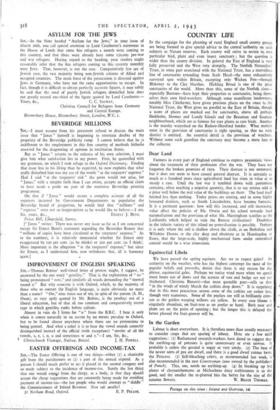IN the campaign for the planning of rural England small
county groups are being formed to give special advice to the central'authority on such subjects as Nature reserves. Each county will strive to secure its own particular bird, plant and even insect sanctuary ; but the question is wider than the county division. In general the East of England is very fully preserved and the West very skimpily. The Norfolk Naturalists' Trust, in some part associated with the National Trust, has a marvellous line of sanctuaries extending from Scott Head—the most exhaustively surveyed spot within Britain, excepting only Wicken Fen—through Blakeney to the Cley Marshes. Hickling Broad is one of the great sanctuaries of the world. More than this, some of the Norfolk clans— especially Buxtons—have kept their properties as sanctuaries, being them- selves their own bird-watchers. Although some munificent landowners, notably Miss Chichester, have given precious places on the coast to the National Trust, the West gives no parallel to the East of Britain, though a score of places are marked out for sanctuaries, above all perhaps Skokhohn, Skomes and Lundy Islands and the Bratmton and Saunton neighbourhood, which are as famous for rare plants as rare birds. Another is the marshy watershed on the Radnor-Hereford border. What matters most in the provision of sanctuaries is right spacing, so that no wide district is omitted. An essential detail is the provision of watchers. Without some such guardian the sanctuary may become a mere lure to the collector.
Dear Land Farmers in every part of England continue to express pessimistic views about the treatment of their profession after the war. They have not forgotten the broken promises of 1919. Their distrust is not unnatural, but it does not seem to have caused general distrust. It is certainly as much as a hundred years since agricultural land has risen in value at so steady a rate. Until the last war it tumbled down with portentous certainty, often reaching a negative quantity, that is to say estates sold at a price well below the real value of the buildings on them. The land itself fetched less than nothing. Today prices are soaring, and in some highly favoured districts,. such as South Lincolnshire, have become fantastic. It is a pertinent question: how will this increased, and still increasing, value affect the policies of Mr. Orwin and his school towards land nationalisation and the provision of what Mr. Massingham scarifies as the Latifundia which helped to ruin the Roman civilisation? Doubtless in the infinite variety of this island no generalisation is possible. Perhaps it is only where the soil is shallow above the chalk, as on Berkshire and Wiltshire Downs or the clay deep and obstinate as- in Huntingdon or Essex, that the large-scale, highly mechanised farm under centralised control would be a wise innovation.
Equinoctial Libels
We have passed the spring equinox. Are we to expect gales? An authority on the weather, who has the highest contempt for most of the popular beliefs and proverbs, denies that there is any excuse for the phrase, equinoctial gales. Perhaps we notice wind more when we spend more hours out of doors and the screens of tree and hedge are not yet thickened. Christina Rossetti—that most quotable poet—tells us that " in the winds of windy March the catkins drop down." It is surprising that in this most precocious season some of the catkins are rather late, though very numerous. Some of the poplars are still as brilliantly crim- son as the golden weeping willows are yellow. In every case bloom is singularly abundant, on fruit-tree as on poplar or hazel. Both pear and plum are on the point of opening ; but the longer this is delayed the better pleased the fruit-grower will be.
In the Garden
Labour is short everywhere. It is therefore more than usually necessary to consider crops that are sparing of labour. Here are a few mild suggestions: (t) Rothamsted research-workers have dared to suggest that the earthing-up of potatoes is quite unnecessary or even unwise. It probably is unless the ground is soggy or very sandy. (2) The best of the newer sorts of pea are dwarf, and there is a good dwarf runner bean, the Princess. (3) Self-bleaching celery, as recommended last week, is also recommended in the new Countryman (now owned by the publisher; of Punch). This, too, needs no earthing-up. (4) In breaking up big plants of chrysanthemums or Michaelmas daisy ruthlessness is to the good, and the smaller the re-planted bits the better for the size of the Postage on this issue : Inland and Overseas, id.


























 Previous page
Previous page